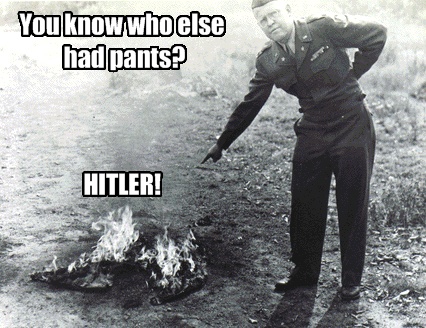two European communists are rewarded with a trip to the glorious Soviet Union, but only one comes back. At work, the fellow traveler is quizzed by a colleague,
“How are living conditions in the Soviet Union?”
“Wonderful. I couldn’t believe my eyes.”
“And how is the housing? How is the food situation?”
“Splendid. I couldn’t believe my eyes.”
“But what happened to your friend?”
“Oh, he’s in Siberia. He did believe his eyes.”
Now, the article has the following to say about lulz during the 30's and 40's:
The sentimental axiom that jokes in, or against, authoritarian societies are liberating certainly does not stand up to scrutiny in the singular case of Nazi Germany. German jokes — and, in particular, those of working-class Berliners, who seem to have conjured up most of the gags — were unusual in that Nazi leaders, not Nazi ideology or the state apparatus, were their butt. This idiosyncrasy would seem to indicate that, at least until very late in the war, many Germans identified with and accepted the regime and its aims. Given that the Reich lasted but 12 years (half of which was occupied by fighting) and the Soviet Empire lasted eight mostly peaceful decades, Germans were not given the same opportunity to witness the Big Lie.
In the German case, political jokes were neither “tiny revolutions” nor pain relievers, but good-natured fun akin to jokes in democratic societies where the political structure is assumed to be legitimate.
I would suggest that telling a derisive political joke was only revolutionary in the period during the war, which the article points out, was fun for that one could be (in theory) put to death for it. Anyway, while the above does not seem unusual to westerners, it was unusual in an authoritarian government, where the State tends to be the target, not the leaders. But you didn't tell jokes about Hitler (especially not during the war), and as is pointed out above: yes, most people of the time were legitimate national socialists. I do have a bit of a niggling issue with the phrasing there, "the regime and it's aims." You all can probably guess this, but I would rather not get into what amounts to Apology, and a subject for other posts.
But let us stop that, for some quality period lulz:
"...on their wedding night, his wife awakes and catches a naked Goering waving his marshal’s baton around. “What are you doing?” she asks. “I’m promoting my underpants to overpants.” Victor Klemperer’s remarkable I Will Bear Witness, 1933-1941: A Diary of the Nazi Years (Random House, 1999) records just one joke between 1933 and 1941. It contrasts the 1917-18 punchline to the question, “How long will the war last?” with its modern equivalent. During the Great War, the answer was, “Till the officers have to eat the same food as the men”; during the Second World War, “Until Goering fits into Goebbels’s trousers.”
And we all know who had pants, don't we?

Now, speaking of:
"As for Goebbels, the minister of propaganda, jokes about him ridiculed his deformities, height, and complexion. It was only his many enemies in the party who tended to circulate those more waspishly commenting on his propagandistic distortions. Ernst Röhm, the brownshirted sa commander executed by Hitler in the Night of the Long Knives, generated a huge number of jokes, all of which harped on his homosexuality, towards which an “innocent” Hitler averted his eyes for a suspiciously long time (as a 1934 joke went: “Just imagine how upset the Führer will be if he gets to know Goebbels has a club foot!”). Perhaps unsurprisingly, the only leading Nazis to escape laughter were Reichsführer SS Heinrich Himmler and his chief executioner, SS-Obergruppenführer Reinhard Heydrich (whose unusually high-pitched voice would otherwise have marked him as a prime target)."
Yes, I know-- everyone is shocked that somehow (within the reich, anyway),

No one understands me...
ReplyDeleteBUT YOU!
So that's how hot pants were invented...
ReplyDelete